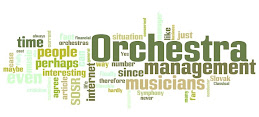Since the emergence of historically informed music practises, in the early 1950s, the camps between the traditionalist and the new ‘rebelious’ or ‘alternative’ performers were somewhat polarised. For some odd reasons, a large group did not want to give in, and the other few would sometimes have the feeling they were the lonely voice calling in the desert. It was as if neither were to meet.
Throughout the years, many new ensembles sprung up all over the world, following the example of Concentus Musicus Wien, the English Consort, the Academy of Ancient Music, and the like, with astonishing results. A whole range of genres were lifted out from the neo-romantic gravy and newly re-performed, with a fresh new sound, giving credit to the authentic vocabulary of the composers. Followed after the early baroque, even renaissance, then classicism, came even up to the romantic period, to be musically scrutinised and reatailored to the ears of the modern audiences, as if you restore an old forgotten painting.
And although, as said, the realm of ‘authentic performers’ seemed a long time to be exclusively for a fanatical few, there is a slow trend, that even the grand masters of the mainstream, are beginning to accept the fact, that perhaps these authentic performances do have justification. Recently, the famous conductor Kent Nagano has begun performing with the Canadian ensemble Tafelmusik Baroque Orchestra. And another highlight; the grand Maestro Bernhard Haitink, year-long chief director of the Royal Concertgebouw Orchestra, known for his Mahler performances.
As he has celebrated his 80th birthday a few days ago, he belongs to the era of the great Maestros of the romantic repertoir. Yet, the perfomance of the Mozart’s Haffner Symphony in Amsterdam was without any neo-romantic elements, as even the (smaller) timpany were from the classical period. A wonderful experience as it is a proof, that autheticity has slowly found its way to the regular concert stream performers and audience. Well, why not? If you want to see the Mona Lisa, you also do not expect a Picasso. Both are equally valuable, yet diverse. And both should be appreciated in their respective “Zeitgeist”. The same with music; the molestation of early music composers’ works with unrealistic style-elements should be banned finally. Professional musicians are grown up people to be able to accept these facts and audiences should demand this quality. Anyway, they pay for their tickets.
MS
Throughout the years, many new ensembles sprung up all over the world, following the example of Concentus Musicus Wien, the English Consort, the Academy of Ancient Music, and the like, with astonishing results. A whole range of genres were lifted out from the neo-romantic gravy and newly re-performed, with a fresh new sound, giving credit to the authentic vocabulary of the composers. Followed after the early baroque, even renaissance, then classicism, came even up to the romantic period, to be musically scrutinised and reatailored to the ears of the modern audiences, as if you restore an old forgotten painting.
And although, as said, the realm of ‘authentic performers’ seemed a long time to be exclusively for a fanatical few, there is a slow trend, that even the grand masters of the mainstream, are beginning to accept the fact, that perhaps these authentic performances do have justification. Recently, the famous conductor Kent Nagano has begun performing with the Canadian ensemble Tafelmusik Baroque Orchestra. And another highlight; the grand Maestro Bernhard Haitink, year-long chief director of the Royal Concertgebouw Orchestra, known for his Mahler performances.
As he has celebrated his 80th birthday a few days ago, he belongs to the era of the great Maestros of the romantic repertoir. Yet, the perfomance of the Mozart’s Haffner Symphony in Amsterdam was without any neo-romantic elements, as even the (smaller) timpany were from the classical period. A wonderful experience as it is a proof, that autheticity has slowly found its way to the regular concert stream performers and audience. Well, why not? If you want to see the Mona Lisa, you also do not expect a Picasso. Both are equally valuable, yet diverse. And both should be appreciated in their respective “Zeitgeist”. The same with music; the molestation of early music composers’ works with unrealistic style-elements should be banned finally. Professional musicians are grown up people to be able to accept these facts and audiences should demand this quality. Anyway, they pay for their tickets.
MS
